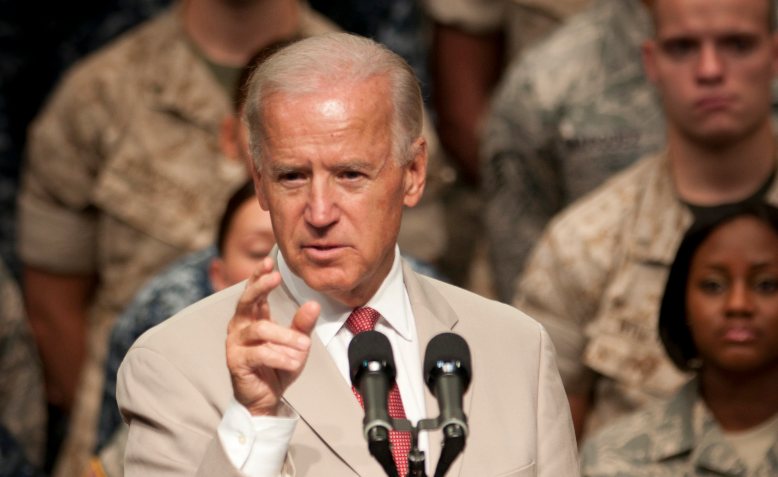 Biden, Yokota Air Base. Photo: Dvidshub / Wikimedia Commons / CC BY-2.0, license linked at bottom of article
Biden, Yokota Air Base. Photo: Dvidshub / Wikimedia Commons / CC BY-2.0, license linked at bottom of article
As the chaotic presidential election inches towards resolution, we can expect more continuity than change in US foreign policy, argues Terina Hine
As the battle for the US president continues beyond election day, one thing we can be confident of, is that whoever ends up in the White House, US foreign policy will be marked more by continuity than by change.
Calm he may be, but Biden is unlikely to a president of peace any more than the erratic Trump.
Anthony Scaramucci, a former Republican who briefly served under Trump but is now a Biden supporter, claimed that Biden’s foreign policy would be tough, and would recognise “adversaries” especially Russia, rather than “denigrating leaders of the free world and making friends with despots.”
Biden’s team say he would attempt to build bridges with NATO and repair the damage done by Trump’s bullish diplomacy, he would address global challenges, moving away from isolationism to reclaim the US’s role in the world. The Democrats stressed the importance of alliances with Japan, Taiwan and South Korea – a clear signal to China whose side they are on.
One pundit on Tuesday night suggested a Biden victory would represent an “Obama third term” and a return to Obama style diplomacy – did they mean smooth talking but deadly? For all his charm let’s not forget it was Obama and the Democrats who championed drone warfare, authorising 10 times more strikes than George W Bush and who designated all males of military age in conflict zones in Afghanistan, Iraq, Pakistan and Yemen, as combatants and fair game for remote killing.
It is China’s growing influence that is seen by Washington as the biggest threat to US hegemony, and on the issue of China the Democrats and Republicans are as one. A growing trade war coupled with aggressive naval patrols in the South China Sea and investment in ‘low yield’ nuclear warheads have marked the US response to date. They are set to continue whoever is the victor of this election.
Biden’s approach to Iran would likely be less confrontational than Trump’s, and the Iran hawks in the White House have certainly made preparations incase Biden wishes to reverse their current hostile policies. The recent round of sanctions is testament to this, adding a layer of complexity which any new administration would find difficult to unpick.
For all his promise to do things differently Biden will not find resetting the nuclear deal an easy task. He claims he wants to reinstate the deal, but only with conditions or “follow-on negotiations” to extend its provisions. Yet this is something he knows Iran is unwilling to countenance.
Making it clear that his leadership would “push back against Iran’s destabilizing activities, which threaten our friends and partners in the region,” Biden has emphasised his pro-Israeli stance. He has promised to work “closely with Israel to ensure it can defend itself against Iran and its proxies.” Hardly the wooing diplomacy of a peacemaker in chief.
Trump, we know from the last four years, is a racist xenophobe, and one who has, as witnessed on election night, scant regard for democracy. Has it ever been more difficult to reconcile a president with the title “leader of the free world”?
The 2016 election campaign was based on a promise to end endless wars. Both then and now it is clear that a number of Americans voted for him because he promised not start any new wars. But rather than delivering peace Trump in fact doubled down on covert and proxy wars in Libya, Syria, Somalia, Iraq, Afghanistan, and Yemen and started a new Cold War with China.
He has goaded his adversaries with threats of full-blown military conflict more than once. He dropped the “Mother of all bombs” on Afghanistan, tore up the Iran nuclear deal and in January of this year assassinated Iran’s most senior military commander, Major General Soleimani.
During Trump’s term in office the US military was “cocked & loaded” against Iran, pulling back from the brink with only minutes to spare. He has toyed with North Korea, threatening nuclear strikes and now is similarly provoking China.
A second Trump term would see a continuation of this machismo style of brinkmanship. Trump and his hawks are pushing for regime change in Iran, hoping to bring the country to heel, while the tensions in the South China Sea, either by accident or design, could easily spill over into direct military confrontation with such an erratic president.
A Biden presidency would be more predictable and less provocative than a second Trump term, but peace and diplomacy is unlikely to be coming from the White House any time soon whoever takes occupancy.
Join Revolution! May Day weekender in London
The world is changing fast. From tariffs and trade wars to the continuing genocide in Gaza to Starmer’s austerity 2.0.
Revolution! on Saturday 3 – Sunday 4 May brings together leading activists and authors to discuss the key questions of the moment and chart a strategy for the left.

